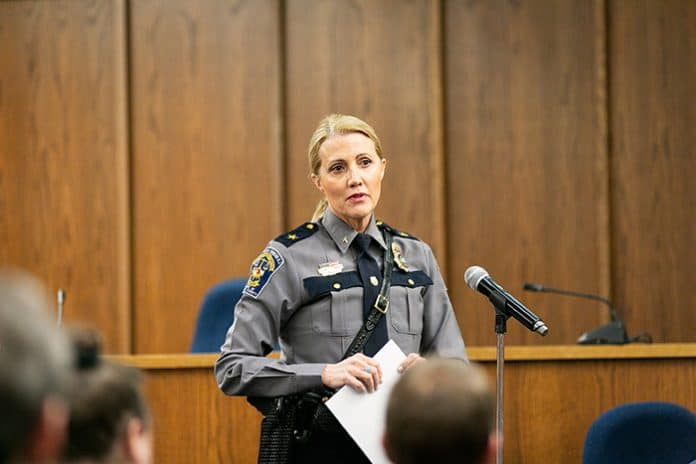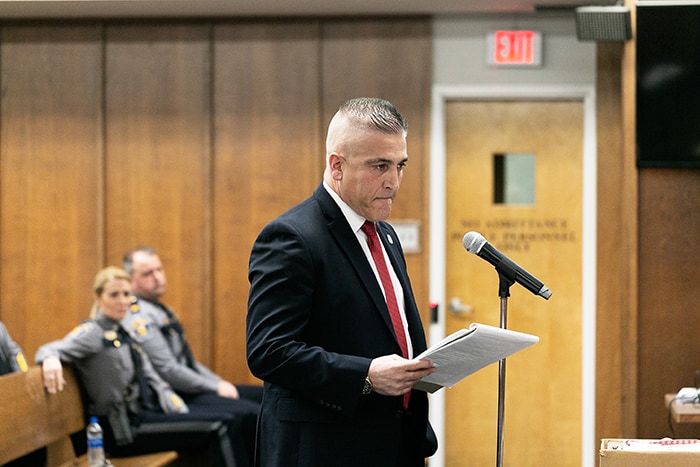
MANCHESTER – The two volunteer first aid squads in Manchester cannot keep up with the rising demands for service amidst its aging population and lack of new volunteers, township officials said. But the answer to that problem may not be forming a paid first aid unit, which detractors warn will cost millions that taxpayers just don’t have.
Police Chief Lisa Parker, who is also the township’s public safety director, spoke briefly at the Feb. 11 Township Council meeting about the conversation she had with members of both the Whiting and Manchester volunteer first aid squads recently. Brian Klimakowski, the former township police chief and life member of the Manchester first aid squad, offered his comments at the Feb. 25 meeting.
Council met in executive session – a closed door meeting excluding the public – with Parker at its March 11 meeting to discuss the matter.
Parker said Feb. 11 that 25 percent of calls are answered by volunteers while 75 percent are answered by outside vendor, “which is unmanaged by Manchester Police or me as Public Safety Director. So that’s concerning.”
That vendor is Quality Medical Transport. The company has had a contract with Manchester first aid for 24 years, and Whiting for 19 years, according to owner Sal Murante Sr.
“It seems to work, and it keeps the volunteers. We support them 100 percent. We’re not here to put them out of business,” Murante said.
A member of the Whiting First Aid who was not authorized to speak with the press on behalf of the squad said Whiting has three rigs but can only run one because of lack of manpower. The squad runs 7 a.m. to 3 p.m. Monday through Saturday and has between 20-25 members.

Marie Klimakowski, president of the Manchester First Aid Squad, said her squad has 27 members and three rigs.
Members from both squads respond to calls from their respective buildings.
Both use Quality Medical Transport to supplement their work. Murante said most of his contracts are with municipalities. He operates 40 rigs – all of which are certified by Department of Health standards and above and beyond that – and 120 employees. As per Medicare rules, Quality must bill clients, but Murante said his company offers payment plans and steep discounts.
The hierarchy of emergency services is spelled out by ordinance.
“The Emergency Management Coordinator oversees the First Aid Squads, the Chief of Police/Director of Public Safety oversees the Office of Emergency Management and the Mayor is the executive of all Department/Division of the Township,” township Business Administrator Donna Markulic said. “But the Township has no authority or control over Quality Medical Transport.”
Parker did tell The Manchester Times after the Feb. 11 meeting that no problems or issues have arisen, that she is aware of, from Quality Medical Transport.
One issue that continues to plague all volunteer organizations is its lack of new volunteers. The township, nearly 83 square miles, receives between 850-1,000 calls a month, according to statistics provided by the county. Call times are anywhere from 20 minutes to more than an hour.
“All I can say is that the Chief of Police has brought to our attention a serious concern and the numbers really speak for themselves. Our volunteers cannot answer the number of calls, nor can they answer even a majority of the calls. When the percentages dropped as low as 25 percent and sometimes even lower, it’s concerning. We would be remiss if we disregarded this issue,” Markulic said. “Volunteerism around the country is dropping. This is not just a Manchester Township issue. The requirements to become an EMT and remain a certified EMT are quite challenging and many in the field flock to paid positions.”
According to the chief, many of the surrounding communities have supplemented with paid EMS.
Parker said Feb. 11, and it was reiterated Feb. 25, that the standards for rejecting applicants to the first aid squad are spelled out by ordinance, usually for disqualifying felonies or misdemeanors. While she has rejected some applicants, she has not done so “arbitrarily.” (Rejected applicants can, in writing, appeal that decision and be accepted if they show “affirmatively demonstrated rehabilitation.”)
“I do not feel that lowering the standard is a good idea,” Parker said.
Brian Klimakowski disagreed. “Some of the tough time is the town’s, is the background checks. People are being denied outside the ordinance.”
He and members and supporters from both squads attended the Feb. 25 council meeting.
“What is the overall reason for moving to paid EMS?” Brian Klimakowski asked. While “balance billing” from Quality Medical Transport may be a concern for residents, the bigger concern as he sees it is all the townships with paid EMS “are in the red.”
He was chief of police and acting business administrator when Mayor Kenneth Palmer came into office. He remembers Palmer’s campaign goal to lower municipal taxes, which have decreased each year Palmer has been in office.

“If we bring on an animal like this, it’s going to grow exponentially,” Brian Klimakowski said. “An ambulance? One hundred eighty to two hundred thousand dollars. A stretcher – $30,000. Employment issues? Some would ask, well then how can they [Quality Medical Transport] do it, and I’d say, it’s because they’re not a government. They’re not hauling the government freight. They’re not dealing with crazy healthcare costs.”
One EMS employee, with salary and insurance under government obligations, could cost $84,000, Brian Klimakowski said.
He added that he was disappointed that no one from either first aid squad was alerted that this issue would come up at a council meeting. He said members of the squads are “stakeholders” in this discussion.
“We should be at the table. We’re stakeholders, right? Unless you just want a complete hostile takeover of the whole thing. Either way, we’re stakeholders,” Brian Klimakowski said. He added that he doesn’t like how the volunteers have been treated in this process.
“We’re not blaming the volunteers. They’re very good. We just don’t have enough of them,” Council President Joan Brush said.
“When the chief spoke to us last meeting, we didn’t make any decision. We said we need to look at the issues, gather data, and come up with workable solution,” Council Vice President Samuel Fusaro said Feb. 25. “We’re here to help and support the residents of Manchester. That is our primary concern. We will look at everything and come up with solution that makes it best for our residents.”






